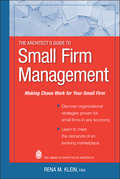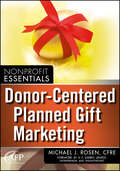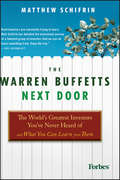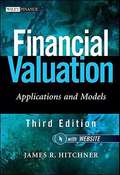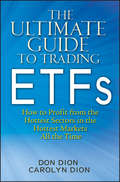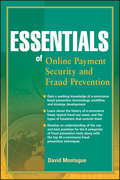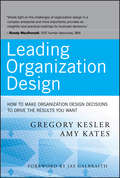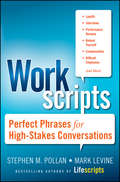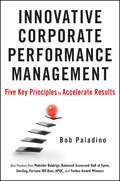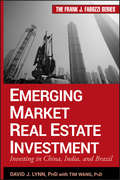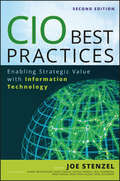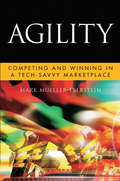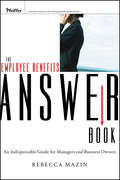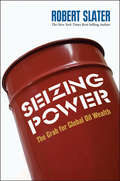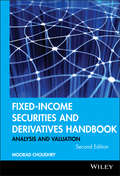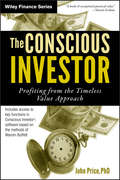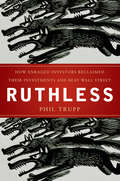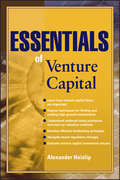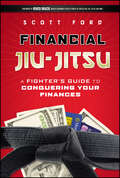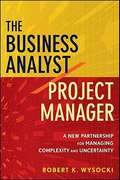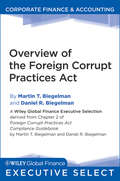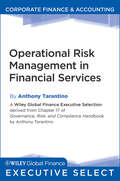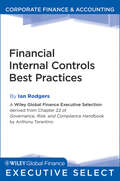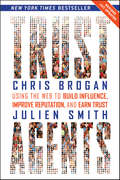- Table View
- List View
The Architect's Guide to Small Firm Management
by Klein Rena M.The definitive guide to management success for sole practitioners and leaders of small design firms Owning and operating a small architectural design firm can be challenging, with tight project deadlines, on-the-fly meetings, rush proposals, and fluctuating workloads as part of the firm's day-to-day activities. To help small firm owners cope with the chaos and prepare for the unexpected, here is The Architect's Guide to Small Firm Management, a no-nonsense guide to repurposing daily demands into workable, goal-directed solutions. Crucial topics such as self-aware leadership, people management, technology, financial health, scenario planning, sustainable practice, and future trends are examined using real-life case studies and business model paradigms. This definitive text explores the whole system experience of a small firm practice to deliver organizational strategies proven to keep a firm's creative mission on a steady, productive path. The Architect's Guide to Small Firm Management addresses how small firm owners can: Deal effectively with unexpected circumstances and shifting work requirements Meet the demands of the marketplace while creating a satisfying workplace Set and achieve goals in an environment of constant change This book is a must-have for those facing the often harsh reality of managing small design firms in a difficult and changing economy. Entrepreneurial architects and designers will discover how to define their own personal and professional meanings of success, as well as how to refocus their business approach to replace long, unrewarding hours with manageable, satisfying ones.
Donor-Centered Planned Gift Marketing
by Michael J. RosenA fresh step-by-step guide for identifying your nonprofit's planned giving prospects and inspiring them to give generously Donor-Centered Planned Gift Marketing helps nonprofit organizations move beyond traditional marketing techniques that have historically yielded only modest results and reveals how putting the focus on the donor can produce the best outcomes for all. Here, nonprofits new to gift planning will learn to market effectively from the start while those with established programs will discover ways to enhance their efforts. You will learn about various donor-centered marketing channels and techniques, as well as how to generate internal support for an improved planned gift marketing effort. Full of useful and proven tips you can implement for immediate results Offers practical tools including forms and checklists Includes a worksheet to help organizations calculate their planned giving potential Sharing the latest research findings, this book shows you how to identify who your planned giving prospects are. You will learn how to effectively focus on them through meaningful communication that ultimately inspires them to give-and give more.
The Warren Buffetts Next Door
by Matthew SchifrinA practical guide for investors who are ready to take financial matters into their own hands The Warren Buffetts Next Door profiles previously unknown investors, with legendary performance records, who are proving every day that you don't need to work for a hedge fund or have an Ivy League diploma to consistently beat the best performing Wall Street professionals. These amazing individuals come from all walks of life, from a globe drifting college dropout and a retired disc jockey to a computer room geek and a truck driver. Their methods vary from technical trading and global macro-economic analysis to deep value investing. The glue that holds them together is their passion for investing and their ability to efficiently harness the Internet for critical investment ideas, research, and trading skills. The author digs deep to find the best of the best, even finding those who are making money during these turbulent times Contains case studies that will explain to you how these great individual investors find and profit from stocks and options. Shows you how to rely on your own instincts and knowledge when making important investment decisions In an era when the best professional advice has cracked many investor nest eggs and Madoff-style frauds have shattered investor trusts, the self-empowered investors found in The Warren Buffetts Next Door offer an inspiring and educational tale.
Financial Valuation
by James R. HitchnerReal world applications and professional consensus by nationally recognized valuation experts Filled with a wealth of detail, practice tips, and examples, Financial Valuation: Applications and Models, Third Edition brings together thirty nationally recognized names in the valuation industry hailing from a variety of professional specializations-including accounting, business appraisal, and financial analysis-to provide practitioners with an indispensable reference on various valuation issues. Assembled by valuation authority James Hitchner, these contributors analyze, explain, and collaborate on the most effective valuation procedures to share real-world applications in the field of financial valuations. Written by 30 top experts in business valuations field Provides the valuation theory, the consensus view on application, and then the tools to apply it An all-encompassing valuation handbook that presents the application of financial valuation theory for business appraisers and consultants New chapters on Assessing Risk and Expert Witness Testimony Expands chapter on Cost of Capital Comprehensive in coverage and authoritative in treatment, James Hitchner's Financial Valuation, Third Edition provides trusted, complete business valuation information for CPAs, appraisers, analysts, attorneys, and corporate executives.
The Ultimate Guide to Trading ETFs
by Don Dion Carolyn DionAn essential guide to trading trends with ETFs At any given time, a particular country's market or a particular segment of the market-such as energy or technology-might be booming. The Ultimate Guide To Trading ETFs provides a time-tested strategy for using exchange-traded funds (ETFs) to profit from these trending markets and sectors. By monitoring the performance of ETFs, authors Don Dion and Carolyn Dion show how to capitalize on these fast-moving, ever-changing trends. He then discusses how to stay ahead of the curve by identifying markets and sectors that are gathering momentum and monitoring those markets for signs that the momentum is losing steam. Dion also explains how you can build a balanced portfolio of ETFs and manage your allocations to profit from the shifting trends. Provides advice for both aggressive investors who are willing to utilize leveraged and short market ETFs, as well as more conservative investors who want to limit risk Highlights a wide variety of ETFs currently available to investors Shows how to profit from fast-developing trends across all markets and sectors The world of ETFs has created many options for individual investors, and The Ultimate Guide To Trading ETFs shows you how to make the most of those opportunities.
Essentials of Online Payment Security and Fraud Prevention
by David A. MontagueEssential guidance for preventing fraud in the card-not-present (CNP) space This book focuses on the prevention of fraud for the card-not-present transaction. The payment process, fraud schemes, and fraud techniques will all focus on these types of transactions ahead. Reveals the top 45 fraud prevention techniques Uniquely focuses on eCommerce fraud essentials Provides the basic concepts around CNP payments and the ways fraud is perpetrated If you do business online, you know fraud is a part of doing business. Essentials of On-line Payment Security and Fraud Prevention equips you to prevent fraud in the CNP space.
Leading Organization Design
by Gregory Kesler Amy KatesPraise for Leading Organization Design"Designing organizations for performance can be a daunting task. Kesler and Kates have done an admirable job distilling the inherent complexity of the design process into manageable parts that can yield tangible results. Leading Organization Design provides an essential hands-on roadmap for any business leader who wants to master this topic." -Robert Simons, Charles M. Williams Professor of Business Administration, Harvard Business School"Kesler and Kates have encapsulated their wealth of knowledge and practical experience into an updated model on organizational design that will become a new primer on the subject." -Neville Isdell, retired chairman and CEO, The Coca-Cola Company"In today's world of global business, organizational design is a critical piece of long-term success. Kesler and Kates have captured multiple approaches to optimize global opportunities, while highlighting some of the keys to managing through organizational transition. A great read for today's global business leaders." -Charles Denson, president, Nike Brand"Leading Organization Design has some unique features that make it valuable. It is one of the few and certainly only recent books to take us through an explicit process to design modern organizations. This is accomplished with the five-milestone process. The process is not a simple cookbook. Indeed, the authors have achieved a balance between process and content. In so doing, Kesler and Kates show us what to do as well as how to do it."-Jay Galbraith, from the Foreword"Sheds light on the challenges of organization design in a complex enterprise and more importantly provides aninsightful and practical roadmap for business decisions."-Randy MacDonald, SVP, human resources, IBM
Wealth Building Strategies in Energy, Metals and Other Markets
by Chris WaltzekHow to find diverse investment opportunities in the emergent global economyThis just-in-time book will help any investor find safe havens that will turn the economic downturn into a unique wealth-building experience. As long as stocks continue to post new highs and surprising lows, investors will need dynamic strategies to make a profit. Wealth Building Strategies in Energy, Metals, and Other Markets explains that money management and long-term trend identification are the keys to investing success. This groundbreaking book includes a proprietary investing system that targets the widest possible array of global indexes with low correlations.Examines what's next for the housing and energy marketsBreaks down major topics such as banking, credit, inflation and deflation, and the mortgage bubble, and shows investors what to expectOffers a key to turning finances around and a path for continued successful investingThe author-host of the popular Goldseek Radio show-includes frequently asked questions and offers expert investing advice.
Workscripts
by Stephen M. Pollan Mark LevineWhat to say in today's toughest workplace situationsWhatever trust previously existed between employer and employee has been torn into millions of pink slips, thanks to the latest recession. As a result, the rules for how managers and employees can successfully communicate have been irrevocably changed. Whether you're a manager or employee, Workscripts explains what to say in life's toughest situations at work, including:* Negotiating severance* Performance reviews* Responding to a pay cut* Asking for a raise or promotion* Terminating a friend* Job interviews* Dealing with difficult bosses* And many more
Innovative Corporate Performance Management
by Bob PaladinoAward-winning strategies to drive game changing meaningful results during the most challenging economy in decadesDrawing from executive and thought leader Bob Paladino's research and advisory experiences and collaboration with award-winning and high-performing organizations, this sequel his global best seller Innovative Corporate Performance Management: Five Key Principles to Accelerate Results provides a clear road map for executing enterprise strategy.Reveals a proven implementation model that has accelerated breakthrough resultsShares over 40 new, innovative best practices common to Malcolm Baldrige, Balanced Scorecard Hall of Fame, Sterling quality, Fortune 100 Best, APQC, and Forbes award winnersProvides a CPM Process Blueprint and diagnostic to score your organization and establish a plan for your award winning performanceOffers a fresh approach to integrating proven methodologies proven by case companies that have been awarded over 100 awardsIncludes key process maps, strategic planning frameworks, strategy maps, customer and competitor intelligence methods, balanced scorecards, comparative tables, project plans, testimonials, charts, graphs, and screen shots of CPM, CRM, BSC and KM systemsAll-new case studies and best practice research are included from world-renowned enterprises as well as insights from executives who have won the most globally recognized awards in business.
Emerging Market Real Estate Investment
by David J. Lynn Tim WangEmerging markets in real estate investing have been an increasing focus for institutional real estate investors worldwide. Part of the Fabozzi series, this book is an insightful overview of international real estate focusing on three of the BRICs: China, India, and Brazil. The authors provide a framework for thinking about these dynamic markets characterized by youthful populations, extraordinary demand, capital inefficiency, and aspiration. Also discussed are the sociopolitical issues, policy, and entry/exit strategies. Notably, the book makes a sanguine assessment of the risks and opportunities of alternative strategies in each country.
CIO Best Practices
by Joe Stenzel Michael H. Hugos Gary Cokins Bill Flemming Randy Betancourt Karl D. Schubert Alyssa Farrell Jonathan HujsakEnabling Strategic Value with Information Technology Second EditionAnyone working in information technology today feels the opportunities for creating and enabling lasting value. The CIO helps define those opportunities and turn them into realities. Now in a Second Edition, CIO Best Practices is an essential guide offering real-world practices used by CIOs and other IT specialists who have successfully mastered the blend of business and IT responsibilities. Compiled and coauthored by Joe Stenzel, the new edition presents a collection of pioneering and successful senior IT executives--including Jonathan Hujsak, Bill Flemming, Mike Hugos, Karl Schubert, and Gary Cokins--whose insights, drawn from years of practical experience, shed new light on the strategic opportunities?available for leadership structures within the IT organization.For anyone who wants to achieve better returns on their IT investments, CIO Best Practices, Second Edition presents the leadership skills and competencies required of a CIO addressing comprehensive enterprise strategic frameworks to fully leverage IT resources.Filled with real-world examples of CIO success stories, the Second Edition explores:CIO leadership responsibilities and opportunitiesThe business impacts of both business and social networking, as well as ways the CIO can leverage the new reality of human connectivity on the InternetThe increasingly inextricable relationships between customers, employees, and their use of personal information technologiesEmerging cultural expectations and standards outside the workplaceCurrent CRM best practices in terms of the relationship between customer preferences and shareholder wealthEnterprise energy utilization and sustainability practices--otherwise known as Green IT--with all the best practices collected here, in one placeBest practices for one of the Internet's newest and most revolutionary technologies: cloud computing and ways it is shaping the new economics of businessThis practical resource provides best practice guidance on the key responsibilities of the CIOs and their indispensable executive leadership role in modern enterprises of all sizes and industries. It is the most definitive and important collection of best practices for achieving and exercising strategic IT leadership for CIOs, those who intend to become CIOs, and those who want to understand the strategic importance of IT for the entire enterprise.
Agility
by Mark Mueller-EbersteinInsider secrets to competing-and winning-in the tech-savvy marketplaceThe new generation of technology savvy workers is changing the way we look at productivity. Agility uniquely describes how technology agility impacts your business's performance and can become a critical success factor. A must-read for leaders defining business strategy and technology implementation, the methodology it describes will show how to measure and drive technology adoption and the derived impact on business results.Includes international cases of various industries, from industry leaders Incorporates the ideas of flexibility, balance, adaptability, and coordination under one umbrella Uniquely describes how technology agility impacts business performanceWhat differentiates Audi, BMW and Mercedes or GM? Understanding it can make or break the future of an organization. Agility makes it clear: the digital divide will be seen in those who take full advantage of the technology versus those merely have it.
The Employee Benefits Answer Book
by Rebecca MazinClear, concise, and comprehensive, this essential resource will help managers?from HR experts to those with minimal experience with benefits?create coherent policies based on a clearer understanding of all employee benefits. Organized by topical area, in an easy to follow question-and-answer format, The Employee Benefits Answer Book includes practical information needed for responding to issues that arise in day-to-day business. Topics discussed include the benefits package, paid time off, enrollment and changes, medical, dental, and vision plan basics; FSAs, transportation, and tuition assistance programs, life insurance and disability, COBRA, and cost control.
Seizing Power: The Grab for Global Oil Wealth (Bloomberg #121)
by Robert SlaterHow oil volatility may lead to violence among oil powers The world supply of oil is running out. Meanwhile, the balance of oil power is shifting away from the United States and the Arab states toward national oil companies (NOCs) in Russia, China, and some emerging economies in Africa and South America. As developing countries seek a middle-class existence, their demand for oil grows exponentially, causing oil prices to spiral, turning some into international bullies. Until another fuel is found the world risks being at the mercy of these tyrants whose insatiable appetites for higher oil prices heighten competition and spur the threat of violence, domestic as well as global. In Seizing Power: The Grab for Global Oil Wealth, bestselling author Robert Slater: Profiles petroaggressors like Russia's Putin, Venezuela's Chavez, and IranÕs Ahmadinejad Describes how oil-rich outlaw nations are using a valuable natural resource as a weapon in global politics Warns that, as oil dwindles, these outlaw nations may turn upon one another in the fight for what oil is left Seizing Power clearly explains why oil is potentially toxic to world stability.
Fixed-Income Securities and Derivatives Handbook: Analysis and Valuation (Bloomberg Financial #122)
by Moorad ChoudhryThe definitive guide to fixed-come securities-revised to reflect today's dynamic financial environment The Second Edition of the Fixed-Income Securities and Derivatives Handbook offers a completely updated and revised look at an important area of today's financial world. In addition to providing an accessible description of the main elements of the debt market, concentrating on the instruments used and their applications, this edition takes into account the effect of the recent financial crisis on fixed income securities and derivatives. As timely as it is timeless, the Second Edition of the Fixed-Income Securities and Derivatives Handbook includes a wealth of new material on such topics as covered and convertible bonds, swaps, synthetic securitization, and bond portfolio management, as well as discussions regarding new regulatory twists and the evolving derivatives market. Offers a more detailed look at the basic principles of securitization and an updated chapter on collateralized debt obligations Covers bond mathematics, pricing and yield analytics, and term structure models Includes a new chapter on credit analysis and the different metrics used to measure bond-relative value Contains illustrative case studies and real-world examples of the topics touched upon throughout the book Written in a straightforward and accessible style, Moorad Choudhry's new book offers the ideal mix of practical tips and academic theory within this important field.
The Conscious Investor: Profiting from the Timeless Value Approach (Wiley Finance #586)
by John PriceAn intriguing look at the full range of value methods brought together for the first time The biggest block to success in the stock market is unconscious investing, or following the crowd without asking the right questions such as: "What is it really worth?" Even more fundamental is: "What rate of return can I confidently expect to get?" Without having the methods to answer these questions is like trying to sail a boat without a rudder. The Conscious Investor covers each of the main methods used to calculate value or return in the stock market, along with descriptions of how and when to use them, as well as their strengths and weaknesses. Interspersed throughout the methods are the timeless investment principles of Benjamin Graham and Warren Buffett. The book: Includes balance sheet methods, dividend discount methods, discounted cash flow methods, price ratio methods, and many others Explains the significance of viewing real value as a combination of a stock's price or market value and its intrinsic value Comes with free access to key functions in the author's Conscious Investor software The Conscious Investor is indispensable reading for everyone with an interest in investing in the stock market, from novices to experienced professionals. Using this book as your guide, you'll quickly discover what it takes to be a conscious investor and gain more confidence in knowing what and when to buy, when to hold, and when to sell.
Ruthless
by Phil TruppRuthless is a candid exploration of the criminal subculture of Wall Street, and one of the first books to speak for the victims of the financial meltdown. On February 14, 2008, author Phil Trupp received a call from one of his brokers telling him a large portion of his investments were frozen--on ice--turning his life and plans for retirement upside down. When the fog started to clear, Trupp realized he was one of many investors caught up in what experts called the greatest attempted securities fraud in modern Wall Street history--a $336 billion scam which made the savings and loan scandal of the 1980s look like a simple street mugging.The path to destruction, financial or otherwise, often begins with a simple proposition. For author Phil Trupp it came from one of his stock brokers: "Take it, Phil. It's free money." This free money came from auction-rate securities (ARS). Auction-Rate Securities are corporate or municipal bonds with a long-term maturity for which the interest rate is reset at frequent auctions. ARS interest rates were higher than money markets and were sold as completely safe, liquid, Triple-A rated "cash equivalents," a deceptive sales pitch that lured hundreds of thousands of investors to buy the securities. Since 2008, most auctions have failed leaving the market largely frozen. The victims ranged from individual investors to the Joffee Foundation, a nonprofit that can no longer fund programs that help prevent AIDS in Africa, to the Port Authority of New York.While this is a classic 21st century tale of Wall Street greed and betrayal, it is also a story of redemption and the life-altering struggle of American investors and others around the world who, in the end, beat the Wall Street fraud-masters. Ruthless is a story of how individual investors became mad as hell and joined together to reclaim their cash investments. So far they've reclaimed more than $200 billion and continue fighting for the rest. A lively, page-turning guide for any investor with a stunning lesson on how to fight back and win.
Essentials of Venture Capital
by Alexander HaislipThe first comprehensive guide for mastering venture capitalEssentials of Venture Capital is your guide to understanding how venture capital and technology finance works from the inside out. Author Alexander Haislip easily explains the most complex concepts in venture capital and how the business is evolving to meet modern market needs. He illuminates the opaque industry that drives innovation in Silicon Valley and beyond.Learn how venture capital firms are organized and managedDevelop techniques for fundraising and making high-growth investmentsUnderstand preferred stock provisions and startup valuation methodsNavigate recent regulatory changes and evaluate investment returnsThe author draws on more than half a decade of experience and interviews with high-level investors in the U.S. and abroad. Whether you are contemplating a career in this industry, hoping to raise money for an entrepreneurial endeavor, or are already a seasoned veteran of venture finance, the book's insights and real-world examples will cement your understanding. Essentials of Venture Capital is the first comprehensive book to explain venture capital, how it is changing and what it will look like in the future.
Financial Jiu-Jitsu
by Scott FordA unique approach to personal finance that tackles money like a jiu-jitsu fighter would tackle an opponentIn martial arts and personal finance, fundamentals are important. But while failing in Brazilian Jiu-Jitsu may be disappointing, it's nothing compared to failing to build wealth and creating a better future for your family.Nobody understands this better than Scott Ford, a top-ranked financial advisor and Jiu-Jitsu enthusiast. Now, in Financial Jiu-Jitsu, he shows you how to overcome your emotions and state of mind to excel at your investing endeavors. Along the way, Ford teaches you fundamental skills such as automating your savings and investments, the importance of paying yourself first, and managing credit wisely.Compares the patience and practice of the martial arts, specifically Jiu-Jitsu, to investingOffers an approach to adapting to financial change as you move through life, while maintaining the same guiding principlesAuthor Scott Ford is ranked in the top one percent of all financial advisorsThe guiding principles in this book are the foundation of your financial fight plan and the keys to reaching your financial dreams. No matter what punches the market or the economy throws at you, if you follow these principles you'll always react well in the face of adversity.
The Business Analyst/Project Manager
by Robert K. WysockiA breakthrough game plan illustrating the need for better collaboration between Project Managers and Business AnalystsIn The Business Analyst/Project Manager, author Robert Wysocki draws on his forty-five years of professional experience as a PM/BA to shed light on the similarities and differences of the roles and responsibilities of these two positions, the need for greater collaboration, and how to staff a project with one or both of these professionals.Examines the boundaries and interactions between the BA and the PMLooks at how to identify the skill sets needed to make the project a successThe typical relationship of the BA and PM across the project management life cycleMaking the best configuration of leadership assignments based on project characteristicsWhere the responsibilities of the BA leave off and the PM's begins and where the two have collaborative responsibilitiesHow to use a PM/BA to enhance project performanceHow to foster a "dual career path" for PM/BAs developmentThe in-depth discussion of the synergies between the two roles and the advantages of a combined PM/BA makes The Business Analyst/Project Manager a valuable contribution in your ability to be successful on the complex projects of the 21st century.
Overview of the Foreign Corrupt Practices Act (Wiley Global Finance Executive Select #5)
by Martin T. Biegelman Daniel R. BiegelmanThis extract is from chapter 2 in Foreign Corrupt Practices Act Compliance Guidebook, by Martin T. Biegelman and Daniel R. Biegelman. The focus is on an understanding of the Foreign Corrupt Practices Act (FCPA) statute, its enforcement policies and penalties, as well as important case law and the role of government. It is not just large, multinational companies that are violating the FCPA; it is also smaller, private companies and individuals who are employing questionable practices. This chapter provides an overview of the statute and how it is applied to best ensure compliance.
Operational Risk Management in Financial Services (Wiley Global Finance Executive Select #3)
by Anthony TarantinoBanking is at the forefront of the effort to quantify and measure operational risk and as such can be role model beyond the financial services industry. The Basel Committee of the Bank for International Settlements (BIS) has created a new capital accord, known as Basel II. Basel II requires banks to establish an operational risk management (ORM) framework and compute an explicit capital charge for operational risk once it is adopted. This chapter from Goverance, Risk, and Compliance Handbook, by Anthony Tarantino, outlines different approaches, tools, and guidance on operational risk management for financial services companies.
Financial Internal Controls Best Practices (Wiley Global Finance Executive Select #1)
by Anthony TarantinoThis chapter from Governance, Risk, and Compliance Handbook, edited by Anthony Tarantino, provides an overview of best practices for financial internal controls. It covers COSO II guidance, automation of controls, and other primary considerations. It also discusses how to achieve ROI on compliance investments.
Trust Agents
by Chris Brogan Julien SmithThe New York Times and Wall Street Journal bestseller-now in a new, updated paperback editionToday's online influencers are Web natives who trade in trust, reputation, and relationships, using social media to accrue the influence that builds up or brings down businesses online. In Trust Agents, two social media veterans show you how to tap into the power of social networks to build your brand's influence, reputation, and, of course, profits.In this revised paperback version, learn how businesses are using the latest online social tools to build networks of influence and how you can use those networks to positively impact your business. Combining high-level theory and practical actions, this guide delivers actionable steps and case studies that show how social media can positively impact your business.New edition features specific first moves for entering social media for small businesses, educators, travel and hospitality enterprises, nonprofit organizations, and corporationsAuthors both have a major presence on the social Web as well as years of online marketing and new media experienceIf you want your business to succeed, don't sit on the sidelines while new markets and channels grow. Instead, use the Web to build trust with your consumers using Trust Agents.
